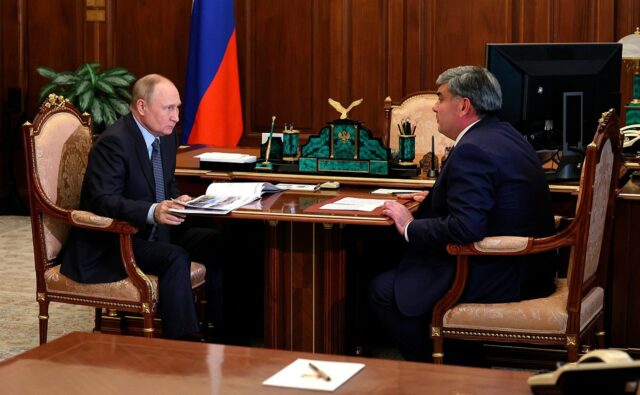Kabardino-Balkaria: The Local Tourism Development Confirms Russia’s Regional Economic Strategy

Kavkaz Files ISSN 2975-0474 Volume 21 Issue 2
Author: OSINT Team
The tourism sector in Kabardino-Balkaria has experienced substantial growth, contributing significantly to the region’s budget. In 2023, the sector contributed 13 billion rubles, marking a remarkable thirteen-fold increase in the past five years.
The head of the republic, Kazbek Kokov, highlighted this achievement during the first municipal hour of the new year. Last year’s tourist flow reached 1.5 million people, with the Elbrus region witnessing a notable 35% increase in visits.
The discernible upswing in the tourism sector within Kabardino-Balkaria underscores Russia’s committed endeavours towards fostering and augmenting tourist infrastructure in the North Caucasus.
This trajectory substantiates Moscow’s unequivocal financial backing for the regional socioeconomic development, a pivotal component in the Kremlin’s strategy to mitigate security challenges and preclude external interference.
Key Findings
- The tourism sector in Kabardino-Balkaria has demonstrated remarkable growth, contributing 13 billion rubles (around $145 million) to the region’s budget in 2023.
- The Elbrus region experienced a significant surge in tourist visits, with a 35% increase compared to the previous year.
- Increasing tourism activities and attractiveness in the North Caucasus Federal District (NCFD) is Moscow’s essential step to stabilise the region.
Background Information
Kabardino-Balkaria has witnessed a substantial evolution in its tourism sector over the past five years. The contribution to the region’s budget has increased from 1 billion rubles in 2018 to 13 billion rubles in 2023.
The surge in tourism is exemplified by a notable increase in the Elbrus region’s visitor rate, reaching 35% in the latest reported figures. The region anticipates further growth, with a projected two million tourists expected by the end of 2024.
Read more | Geopolitics of the North Caucasus: An Analysis of Local Ethnic Minorities and Indigenous Peoples |
Analysis
The growth of the tourism industry in Kabardino-Balkaria shows a promising economic future for the region. The significant increase in contribution to the budget underscores the industry’s economic significance. The heightened popularity of the Elbrus region highlights the regional and Russian strategic focus on leveraging natural attractions for tourism development.
Geopolitically, this economic growth could enhance the region’s stability and influence within the larger national context. The surge in tourism aligns with broader trends in regional development, showcasing Kabardino-Balkaria as a viable destination for both domestic and international travellers.
Since 2010, following the Kremlin’s establishment of the North Caucasus Federal District (NCFD) and the subsequent initiation of the Strategy 2025, Moscow has demonstrated a strategic commitment to underpin regional socioeconomic advancement.
The overarching goal of generating over 400 thousand job opportunities, coupled with the systematic development of logistics, transport corridors, and tourist clusters, has been pivotal. Attracting foreign direct investments (FDIs) has been a cornerstone, fostering economic growth in the North Caucasus.
A retrospective analysis of the past decade reveals a discernible decline in violent attacks and instability, with concurrent positive strides in tourism and industrial development across the North Caucasus.
The tangible results achieved by the Republic of Kabardino-Balkaria in the tourism sector stand testament to implementing Moscow’s regional strategy, underscoring the region’s pivotal role in maintaining Russian domestic stability and shaping foreign policy dynamics.
Kabardino-Balkaria:
Risk Assessment
While the tourism industry’s growth presents economic benefits, it also poses inherent risks. Overreliance on tourism revenue may render the region vulnerable to fluctuations in the travel industry, influenced by global events and economic downturns. Increased tourist numbers may strain local infrastructure and natural resources, necessitating careful management to ensure sustainable development.
Geopolitically, the region’s dependence on tourism could be impacted by broader national and international dynamics, especially coming from the consequences of Western sanctions against Moscow because of the Ukraine conflict or a possible resurge of violent attacks coming from terrorist organisations which are still present in the territory of the North Caucasus and the Russian Federation in form of terrorism financing and jihadist propaganda.
Scenarios Analysis
- Sustained Growth. If Kabardino-Balkaria effectively manages and sustains its tourism sector growth, the region could continue to experience economic prosperity, attracting further investments and contributing positively to its overall development.
- External Shocks. In the face of unforeseen global or national events impacting the tourism industry, Kabardino-Balkaria may face economic challenges, highlighting the need for diversification and risk mitigation strategies.
- Infrastructure Strain. Rapid growth in tourist numbers could strain local infrastructure and environmental resources. Implementing effective management and development plans will be crucial to mitigate potential negative impacts.
Conclusion/Recommendations
In conclusion, the evolution of the North Caucasus over the last ten years reflects a paradigm shift, where the region has transitioned from a historically turbulent state to a zone witnessing positive outcomes in both economic and security domains. This transformation aligns with Moscow’s strategic vision, affirming the region’s newfound stability as essential not only for domestic equilibrium but also for the broader contours of Russian foreign policy.
The current positive trajectory of Kabardino-Balkaria’s tourism sector offers substantial economic benefits. However, to ensure sustained growth and resilience to external shocks, the region should focus on diversifying its economy, investing in infrastructure, and implementing sustainable tourism management practices. Strategic collaborations with relevant stakeholders, including the private sector and local communities, will be essential for the long-term success of the tourism industry in Kabardino-Balkaria.
For those with an interest in acquiring comprehensive insights into political and economic dynamics of Kabardino-Baker and the North Caucasus, we encourage you to reach out to our team by sending an email to info@specialeurasia.com. We are poised to facilitate an assessment of the opportunity for you to obtain a meticulously crafted and specialised report tailored to your intelligence needs.
Read more | Bridging Nations: Promoting Cooperation between North Caucasus and Iraq through Education and Research |
